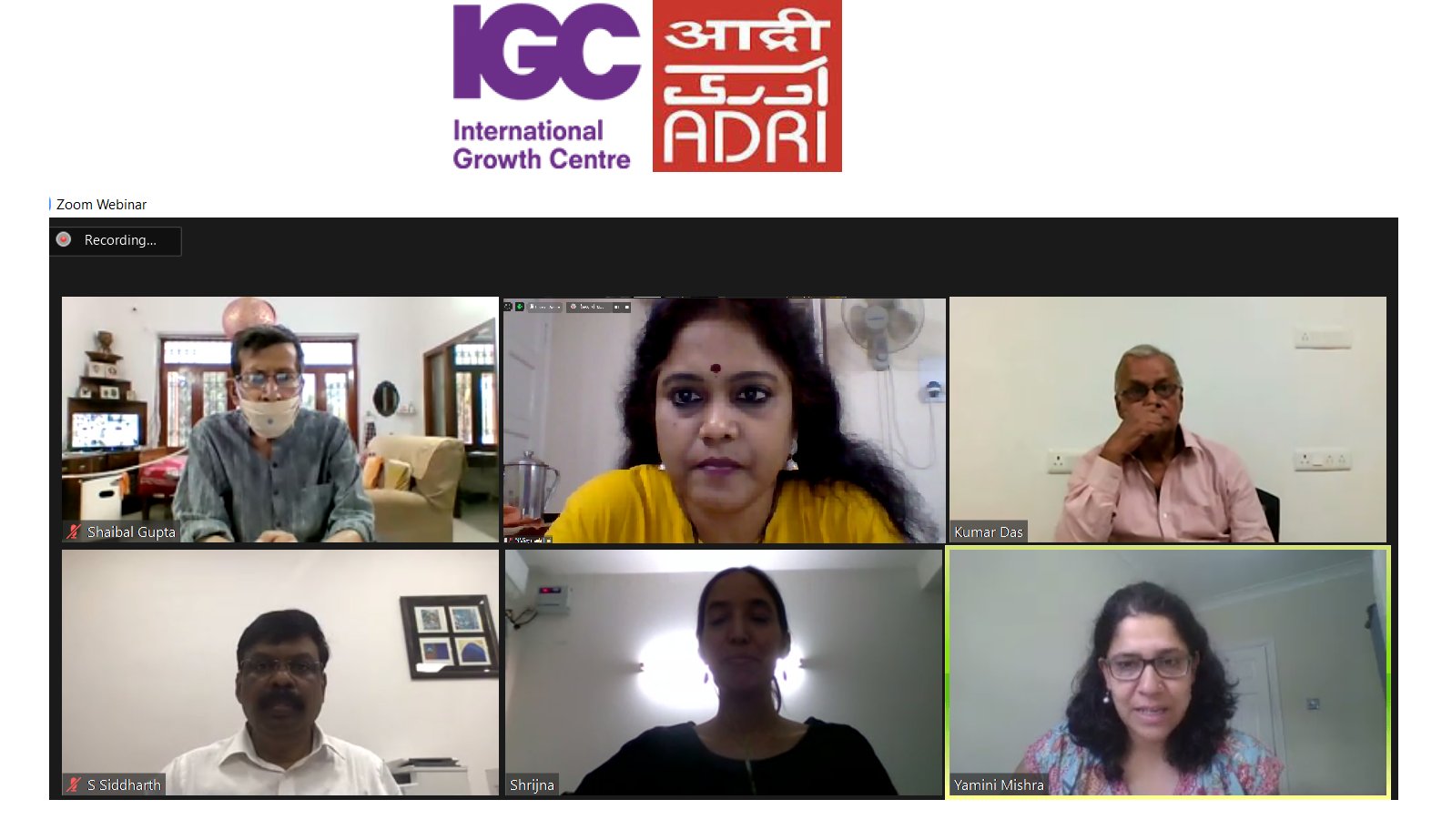Events of IGC

Panelists: S SIDDHARTH* (Principal Secretary – Finance Department, Government of Bihar), SHRIJNA DIXON (Principal Investigator – International Growth Centre), YAMINI MISHRA (Director - Gender, Sexuality and Identity Programme - Amnesty International)
Date and Time: 24th September 2020, 17:00 to 18:15 (IST)
Zoom Link for Registration: Registration Link
Brief: With Bihar completing over ten years of GRB efforts, starting from the publication of the first Gender Budget Statement in 2008-09, the research is in time to document the trajectory of the state's GRB efforts.This research undertakes a critical stocktaking assessment of Government of Bihar’s institutional processes and mechanisms on GRB. And key recommendations will be made to streamline, strengthen, and sustain initiatives that contribute more effectively to achieving gender-equitable outcomes and impacts for the most marginalised sections of society. Join us for a webinar where we will discuss Gender Responsive Budgeting (GRB)'s existing efforts and pipeline mechanisms in Bihar and how it responds to the needs of women, girls and the most marginalised communities.
Patna, September 24. International Growth Centre (IGC) and Asian Development Research Institute (ADRI) organised a webinar titled, ‘A Roadmap for Closing Gender Gaps in Bihar: Gender Responsive Budgeting’ on 24th September 2020. The event was started by Dr.Shaibal Gupta (Member Secretary - ADRI) welcoming the panelist for the day. The panel was moderated by Yamini Mishra (Director - Global Issues Programme - Amnesty International). The event panellists were N Vijaya Lakshmi (Principal Secretary - Government of Bihar), Shrijna Dixon (Principal Investigator – International Growth Centre), S Siddharth (Principal Secretary – Finance Department, Government of Bihar).
Gender Responsive Budgeting (GRB) is a critical global accountability framework to plan, allocate, programme, and monitor adequate resources by governments to fulfil their commitments on gender equality and women’s empowerment (GEWE)
Bihar is one of the early starters on GRB, with the first known GRB initiative in 2008-09. Bihar’s budgets allocated for Gender Equality and Women’s Empowerment (GEWE) are about 3 percent of the state’s GDP and 14 percent of the state’s budget in 2019-20. While the overall state budget estimates increased over a range of three to twenty-seven percent during this period, gender budgets appear to have increased only marginally. Additionally, the growing trend of gender budget percentage to overall state’s GDP is established with a strongly positive linear correlation between GSDP and GEWE Budgets. This correlation conveys a strongly positive relationship between gender budgets and the state’s fiscal attribute.
While Government of Bihar’s policy commitments on GRB are a step in the right direction, they do not seem to be enough to demonstrate output and outcome level results in GEWE, which must be recorded and monitored to address generational gender inequality, discrimination and marginalisation. The research proposed that the state’s policy commitments on GEWE must be realised through a robust operational GRB architecture where key institutional actors identify their roles and responsibilities.
Shrijna Dixon (Principal Investigator – International Growth Centre) presented the research report. She also emphasized the statement by the UN - “every COVID-19 response plans, and every recovery package and budgeting of resources, needs to address the gender impacts of this pandemic.” - highlighting the importance of Gender Responsive Budgeting becomes more crucial in times like pandemic. She also mentioned that the recently launched Covid 19 tracker of UNDP and UN Women is able to provide gender-segregated data which highlights that there is an increase of violence against women during the Covid 19 lockdown.
N Vijaya Lakshmi (Principal Secretary - Government of Bihar) mentioned that GRB landscape in the state was in very primitive state and lack of awareness around GRB, from then to today we have taken significant steps to make government officials become more aware and hand-held them and conducted sensitization workshops with 22 depts around this issue. She further added that institutional development is one of the stumbling blocks for GRB and hence a mechanism to develop institutions is very important for GRB to be implemented well. She also emphasized the importance of data, particularly data related to women, and using the data. And it is not enough just to gather data but also to analyze those for further use.
S Siddharth (Principal Secretary – Finance Department, Government of Bihar) mentioned that when we make a budget we make it based on estimation of resources for the year. One of the challenges we face is when constraints of resources appear how does GRB perform, this is something we would be interested to look into. It is a very difficult challenge to decide how to apportion resources for the asset-creation aspect of the budget.
Closing remarks were given by Dr. Prabhat Ghosh - Director ADRI. He emphasized on women self-help groups and how they can be included in the GRB exercise in future.
Through this programme, ADRI and IGC intend to provide knowledge support to the Government of Bihar, and also to make available to them our experience of engaging other state governments. This Webinar is but one example of ADRI and IGC’s strong convening power and partnership-building capacity.